Books about Reading (and Writing): A Reading List from Emily Hanford

Emily Hanford is Planet Word’s first Journalist-in-Residence and host of the groundbreaking APM Reports podcast Sold a Story: How Teaching Kids to Read Went So Wrong. In recognition of National Literacy Month, she has curated a book list for Planet Word about reading, writing, and telling compelling stories.
A couple of years ago, when Sold a Story first came out, I put together a list of ten things to read if you want to know more about the science of reading. This list expands on that and includes some of my favorite books about writing and storytelling, too.
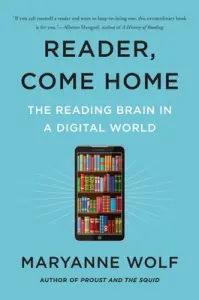
Reader, Come Home: The Reading Brain in a Digital World, Maryanne Wolf
Aren’t we all thinking about what is happening to our attention spans and our reading habits these days? Maryanne Wolf sure is. In this book, she describes what is happening to our brain as it adapts to the digital world. And what this means for children, who will never know what it’s like to grow up in a world without tablets and cellphones. Wolf was our guest at Planet Word on September 18, 2024.
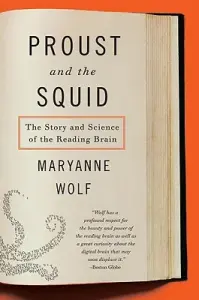 Proust and the Squid: The Story and Science of the Reading Brain, Maryanne Wolf
Proust and the Squid: The Story and Science of the Reading Brain, Maryanne Wolf
Another one by Maryanne Wolf! This is one of the first books I read about the science of reading. I think it was 2016; I knew pretty much none of this and it rocked my world. What Wolf can do like almost no one else is tell you a story about what all the scientific research means. And she does it with ample references to her favorite authors. You’re going to get nods to Austen, Tolstoy, Hemingway, Dickinson, Eliot, Joyce, Melville — and of course, Proust.
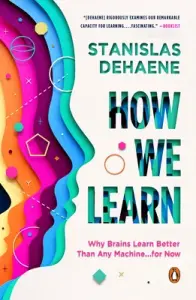 How We Learn: Why Brains Learn Better Than Any Machine… for Now, Stanislas Dehaene
How We Learn: Why Brains Learn Better Than Any Machine… for Now, Stanislas Dehaene
This is an absolutely fascinating look at the latest research on our brains and how they learn. There’s lots of interesting stuff in here about artificial intelligence, too, and how the AI revolution is not just helping scientists understand the potential of machines, it’s helping scientists better understand human learning — and just how amazing our brains are! Dehaene was our guest at Planet Word in April 2024. You can watch a video of his talk here.
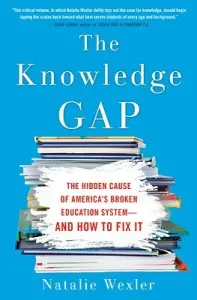 The Knowledge Gap: The Hidden Cause of America’s Broken Education System — and How to Fix It, Natalie Wexler
The Knowledge Gap: The Hidden Cause of America’s Broken Education System — and How to Fix It, Natalie Wexler
Natalie Wexler has done more than almost anyone to bring attention to a problem that may surprise you: many schools are not equipping their students with the knowledge they need to become good readers. Wexler shows how schools have recently focused so much on the decontextualized “skills” of reading comprehension that they have failed to teach the actual knowledge kids need to make sense of what they read. This book is illuminating and at times shocking and is helping many educators better understand what kids need to learn to become good readers.
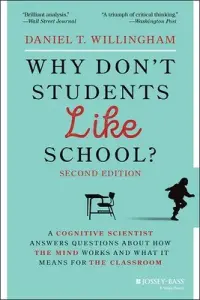 Why Don’t Students Like School? A Cognitive Scientist Answers Questions About How the Mind Works and What It Means for the Classroom, Daniel Willingham
Why Don’t Students Like School? A Cognitive Scientist Answers Questions About How the Mind Works and What It Means for the Classroom, Daniel Willingham
This book starts with the observation that scientists have learned more about how the mind works in the last twenty-five years than in the previous twenty-five hundred — but this knowledge has not made its way into many classrooms. Willingham then explores nine principles about learning and the mind that teachers should know. And if they did, school would probably be more enjoyable — and more effective! The insights include things like, “factual knowledge must precede skill” (in other words, you can’t just Google it. You need to know stuff). It’s a delightful book.
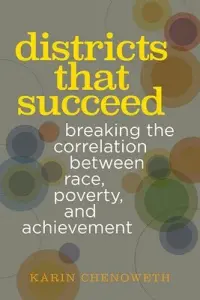 Districts that Succeed: Breaking the Correlation Between Race, Poverty, and Achievement, Karin Chenoweth
Districts that Succeed: Breaking the Correlation Between Race, Poverty, and Achievement, Karin Chenoweth
Reporter Karin Chenoweth spent her career visiting schools that are disrupting the link between high poverty and low academic achievement. Her approach was inspired by Ronald Edmonds, a pioneer in the field of effective schools research, who said back in 1982: “First you identify schools that produce the outcomes you’re interested in. Then you watch them and try to figure out what makes them different from the ineffective schools.” In this book, Chenoweth widens the lens to look at the critical role of school districts. She shows us the systems that are proving the potential of children in poverty all over this country.
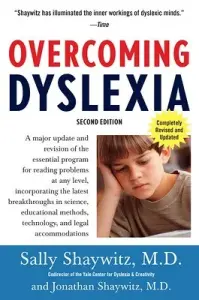 Overcoming Dyslexia, Sally Shaywitz
Overcoming Dyslexia, Sally Shaywitz
This book has provided countless confused and worried parents with answers for why their children are having a hard time learning how to read. It provides a fascinating history of evolving knowledge about dyslexia, how to identify it, and what to do about it. It’s guided by the hopeful premise that all children can be taught to read and includes stories of people who have overcome — and even embraced — their dyslexia and gone on to become good readers and very successful people.
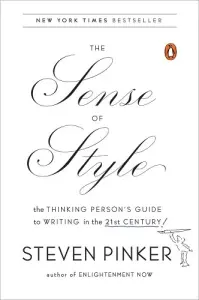 The Sense of Style: The Thinking Person’s Guide to Writing in the 21st Century, Stephen Pinker
The Sense of Style: The Thinking Person’s Guide to Writing in the 21st Century, Stephen Pinker
I’ve seen this book referred to as the new Strunk and White. Steven Pinker (a member of the Usage Panel of the American Heritage Dictionary) is a superb writer who also happens to be a cognitive scientist. He brings his appreciation for language and learning together in this insightful book. He says: “Good writing can flip the way the world is perceived.” I couldn’t agree more.
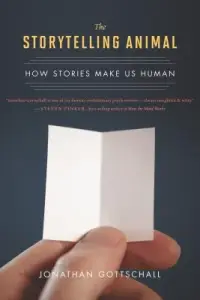 The Storytelling Animal: How Stories Make Us Human, Jonathan Gottschall
The Storytelling Animal: How Stories Make Us Human, Jonathan Gottschall
When people ask me why Sold a Story has had such an impact, I often recite this quote: “A story’s most important function is to remind us we are not alone in the world.” I don’t know who said it, but it sums up what Jonathan Gottschall explores in this book. He explains why stories are so fundamental to us as humans. Indeed, you could argue that stories are what make us human. I love this book because it blends science and story elegantly and accessibly.
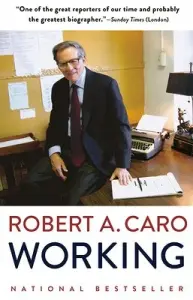 Working: Researching, Interviewing, Writing, Robert A. Caro
Working: Researching, Interviewing, Writing, Robert A. Caro
This book has nothing to do with cognitive science or how we learn to read. It’s a series of personal reflections on writing by Robert Caro, the biographer whose massive books on Robert Moses and LBJ explore the nature of power. This book is slim by comparison (just over 200 pages). It’s about why Caro writes and how he does it and I loved the glimpse behind the scenes. There’s also an incredible documentary film, Turn Every Page, about Caro’s relationship with his longtime editor, the late Robert Gottlieb. It includes a fantastic scene about a pencil.
Bookshop.org is an online bookstore that supports local, independent bookstores and publishers. Planet Word is an affiliate of Bookshop.org and will earn a commission if you click through and make a purchase.

-
Did you know?
Perhaps ironically, the word “sesquipedalophobia” means “the fear of long words.” -
Did you know?
“Contronyms” are words that contain multiple meanings that are complete opposites of each other. For example, “oversight” means both “the action of overseeing something” and “a failure to notice something.” -
Did you know?
There are over 7,000 languages worldwide, but more than half the world’s population speaks only 23 of these languages. -
Did you know?
The first entirely artificial language was the Lingua Ignota, a private mystical cant recorded in the 12th century by St. Hildegard of Bingen. -
Did you know?
The 10 most-used letters in English are E, A, R, I, O, T, N, S, L, and C. -
Did you know?
Eels, llamas, and aardvarks, ooh my! In English, there are only four letters that appear as double letters at the beginning of a word: A, E, L, and O. -
Did you know?
A “deipnosophist” is a person who’s really good at making conversation at the dinner table. -

How do you get a dog to stop eating your books?
Take the words right out of its mouth! -

What's the difference between a cat and a comma?
A cat has claws at the end of its paws, but a comma’s a pause at the end of a clause. -
The past, the present, and the future walk into a bar...
It was tense. -
Is there a word that uses all the vowels including y?
Unquestionably. -
Riddle me this
What did the intransitive verb say when told it was pretty? (Answer: Nothing. Intransitive verbs can’t take complements.) -
Riddle me this
What does an island and the letter T have in common? (Answer: They’re both in the middle of water.) -
Riddle me this
What word becomes shorter when you add two letters to it? (Answer: Short) -
Riddle me this
What starts with an E, ends with an E, and contains just one letter? (Answer: An envelope!) -
Riddle me this
What begins with a T, ends with a T, and has T in it? (Answer: A teapot!) -
Riddle me this
What’s in centuries, hours, and years, but not minutes, days, or seconds? (Answer: The letter R!) -
Quote them on it
“Outside of a dog, a book is a man’s best friend. Inside of a dog, it’s too dark to read.” — Groucho Marx -
Quote them on it
“The past is always tense, the future perfect.” — Zadie Smith -
Quote them on it
“If there is a book that you want to read, but it hasn’t been written yet, you must be the one to write it.” — Toni Morrison -
Quote them on it
“A reader lives a thousand lives before he dies...The man who never reads lives only once.” — George R.R. Martin -
Quote them on it
“If you talk to a man in a language he understands, that goes to his head. If you talk to him in his language, that goes to his heart.” — Nelson Mandela

